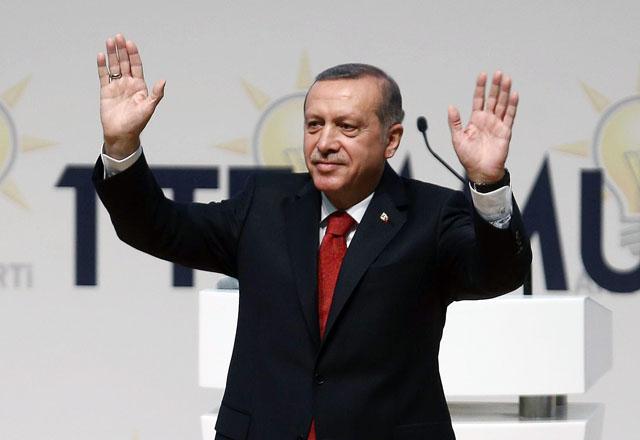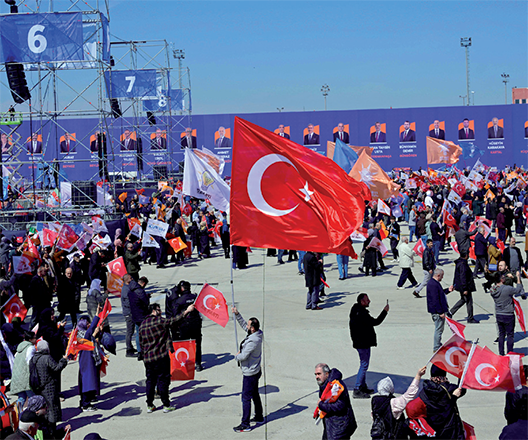You are here
Erdogan wins Turkish presidency in first round triumph
By AFP - Aug 10,2014 - Last updated at Aug 10,2014
ANKARA — Turkish Prime Minister Recep Tayyip Erdogan won an outright victory in the first round of presidential election on Sunday.
Erdogan won 51.8 per cent of the vote, way ahead of his main opposition rival Ekmeleddin Ihsanoglu on 38.6 per cent, according to official results based on a 99 per cent vote count.
The third contender, Kurdish candidate Selahattin Demirtas, won 9.6 per cent of the vote.
Erdogan's inauguration is set for August 28.
The result marked a personal triumph for Erdogan, 60, who has served as premier since 2003 and could potentially now be president for two mandates until 2024.
He has promised to be a powerful president with a beefed-up mandate, in contrast to the ceremonial role played by his recent predecessors.
The polls are the first time Turkey — a member of NATO and longtime hopeful to join the EU — has directly elected its president, who was previously chosen by parliament, and Erdogan hoped for a massive show of popular support.
As the results came out, Erdogan briefly addressed hundreds of supporters in Istanbul before praying at the historic Eyup Sultan Mosque built after the 1453 conquest of Constantinople by the Ottomans.
"As long as I am alive, I will continue our struggle to sustain a more advanced democracy," said Erdogan.
The president-elect has said he plans to revamp the post to give the presidency greater executive powers, which could see Turkey shift towards a system more like that of France if his ruling Justice and Development Party (AKP) succeeds in changing the constitution.
But Erdogan's opponents accuse him of undermining the secular legacy of Turkey's founding father Mustafa Kemal Ataturk, who established a strict separation between religion and politics.
“A ballot paper with only one name does not represent the democracy, it does not suit Turkey,” said Ihsanoglu, 70, as he cast his ballot in Istanbul.
He complained that the campaign had been “unfair, disproportionate”, nonetheless predicting that the votes of the “silent masses” would help him to victory.
While many secular Turks oppose Erdogan, he can still count on a huge base of support from religiously conservative middle-income voters, particularly in central Turkey and poorer districts of Istanbul, who have prospered under his rule.
“He has helped feed the poor and reached out to a larger section of our society,” Zahide, 52, a retired nurse, after voting in Istanbul for Erdogan.
But Ozlem, 24, a university student, said she voted for Ihsanoglu. “Our country is at a turning point. It’s either democracy or dictatorship. Everyone should come to their senses.”
Regional breakdowns of the results showed a clear geographical polarisation of the country, with Ihsanoglu taking the strongly secular western coast, Demirtas the Kurdish southeast but Erdogan the Black Sea coast, Istanbul and the entire heart of the country.
Erdogan endured the toughest year of his rule in 2013, shaken by deadly mass protests sparked by plans to build a shopping mall on Gezi Park in Istanbul that grew into a general cry of anger by secular Turks who felt ignored by the AKP.
The future of outgoing president Abdullah Gul, a co-founder of the AKP who appears to have distanced himself from Erdogan, is unclear.
Foreign Minister Ahmet Davutoglu is tipped as a possible choice to be premier.
Recalling that he was the last Turkish president to be elected by parliament, Gul said after voting that he wished Turkey proceeds “on its path by keeping its democracy and law stronger and consolidating its economy”.
Related Articles
Turkish President Abdullah Gul said he would not seek a second term in office, further raising the likelihood that Prime Minister Recep Tayyip Erdogan would run for the top job.
Turkish Prime Minister Recep Tayyip Erdogan declared Tuesday he would stand in August’s presidential election, paving the way to become the country’s longest and most dominant serving leader since Ataturk.
ISTANBUL (AFP) — Turks will vote next Sunday in local elections as President Recep Tayyip Erdogan, buoyed by a strong showing in last year's


















